初一英语上学期unit6-2PPT优选课件
人教七年级英语上册Unit 6 Section B2 课件(共25张PPT)

Read the magazine article to find out Cindy’s eating habits.
To learn to write about your eating habits.
What do you like for breakfast, lunch and supper?
谢谢观赏
You made my day!
我们,还在路上……
2. volleyball 排球 volleyballer 排球运动员 后缀-er一般用来表示人。
e.g. work (工作) --- worker(工人) sing(唱歌) --- singer(歌手) teach (教) --- teacher(教师) run (跑) ---runner(跑步的人)
Unit 6 Do you like bananas?
七年级(上)
Read the words and expressions aloud.
Words and expressions
star 明星;星星 eat 吃 well 好;令人满意地 habit 习惯 healthy 健康的 really 真正地 question 问题 want 需要;想要 be 变成 fat 肥的;肥胖的
3. I like chicken for dinner. 晚餐我喜欢吃鸡肉。
1) for dinner在句中作状语。 2) have /has也可以表示 “吃”或 “喝”。
英语中人们习惯用have来表示吃早、 中、晚饭。而不用eat来表示, 且三餐 前不加定冠词the。 e.g. Let’s have lunch. 我们吃午饭吧。
Let’s have some salad. 让我们吃些沙拉吧。
人教版初中英语七年级上册Unit 6 Section A (1a-2d)-课件

A: Do you like salad? B: No, I don’t.
A: Do you like oranges? B: Yes, I.
2b Listen again. Fill in the blanks.
2c (Imagine you are having lunch with your friend.) Practice the conversations in 2b. Give answers
that are true for you.
2d Answer the questions below and then role-play the conversation.
Do you like bananas? 1 Yes, I do.
3
Do you like oranges? Yes, I do.
Practice
1c Practice the conversations above with your
partner. Then make you own conversations.
A: I like _h_a_m__b_u_r_g_e_rs__. Do you like _h_a_m_b_u_r_g_e_r_s____? B: Yes, I do. A: Do you like_t_o_m_a_t_o_e_s ? B: No, I don’t like___to_m__a_t_o_e_s___. A: Let’s have _ic_e_-_cr_e_a_m_. B: Oh, no. A: No? B: I don’t like _ic_e_-_cr_e_a_m___.
七年级英语上学期Unit 6 Period 2PPT课件
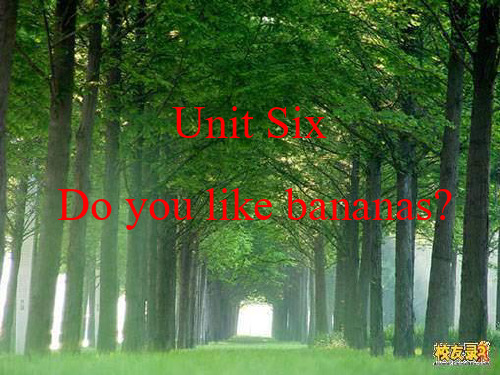
Does he like very much? 3 She has lunch at school.提问
Where does she have lunch? 4 I have a pen and a pencil .提问
What do you have ?
2020年10月2日
13
演讲完毕,谢谢观看!
juice
pineapple
ham
cauliflower chicken
jiaozi
2020年10月2日
dumplings
mushroom
6
Listen and fill in the blanks.
A:I like_h_a_m_b_u_r_g_er_s, do you like __ha_m__b_u_r_ge?rs
汇报人:XXX 汇报日期:20XX年10月10日
14
dessert, ice cream.
2020年10月2日
11
Rewrite the words.
1 tomato (复数)tomatoes 2.fry (复数)fries
3 strawberry (复数)strawberries
4 too (同音词) two/to 5.have(单数形式)has 6 she (复数)they 7 boring (反义词)interesting
七年级英语上册Unit6 PPT课件

half an apple
three apples
a piece of orange
two oranges
a
piece of tomato
three tomatoes
six
pears
some bananas
a strawberry
many strawberries
potatoes a potato
结束放映
food
name
S1
S2
S3
S4
apples bananas oranges strawberries French fries hamburgers ice cream salad tomatoes broccoli pears
1. 听磁带跟读至少5次, 背诵默写。(家长签 字) 2. 制作一份调查表,调 查你的家人喜爱的食 物。
ice cream
salad
Match the words with the pictures on page 31. hamburgers ____ d tomatoes ____ g ice cream ___ f c salad ___
broccoli ___ a
French fries ___ h orange ___ e
Does he like Does she like
? ?
Yes, she does.
No, she doesn`t.
Do you like bananas? Do they like oranges? Does he like broccoli?
Yes, I/we do. No, I/we don`t.
Unit6SectionA2a2d课件人教版英语七年级上册

Exercises:
二.根据句意和首字母填单词: 1. Do you l_______ salad? 2.I want to eat (想吃)some b_________. 3. Many p______ are on the table. 4. My mother and father are my p__________. 5. Let’s play t________. 6. That s_______ good.
3. John likes burgers, salad, apples and __A__. A. strawberries B. pears C. banana
Read the dialogue in 2d. Then answer the questions.
Does John like hamburgers? Yes, he does.
hamburgers milk bananas strawberries pears
tomatoes bread salad
oranges ice-cream
bread
bread
A: Does he like bread? B: Yes, he does. He likes bread.
ice cream
fruit
tomatoes
oranges
strawberries
pears
bananas
food salad
bread
hamburgers
rice
milk ice-cream
a banana
an orange
bananas
oranges
a pear
pears
七年级上Module 6 unit 2PPT优选课件

2020/10/18
17
• 3. price 表示“价格;价钱” • 询问“价格;价钱”的句型: • What’s the price of …?=How
much is/are...? • 这本字典多少钱? • What’s the price of the
dictionary?
• =How 2020/10/18 much is the dictionary18 ?
Best wishes,
Betty 2020/10/18
13
2020/10/18
14
• 1. 短语:
① 一场魔术表演:a magic show
② 狮子王:The Lion King
③ 一节太极拳课:a Taijiquan class
④ 一节游泳课:a swimming class
⑤ 一节钢琴课:a piano class
2020/10/18
1
READING
Taijiquan class
THIS magic show WEEK
The Lion King
football match
2020/10/18
2
1
Taijiquan class Day: Sunday Time: in the morning
(10:00~12:00) Place: Garden Hotel Price: 60 yuan
12
From: Betty
To: Tony
Day: Tuesday
Hi!
Would you like to come to the cinema(1)_o_n_F_r_i_d_ay__? The film is The Lion King.It’s (2)_i_n_t_h_e_a_f_te_r_n_o_o_n___and in the evening. It’sat New Times Cinema (3)_________________.
最新人教版七年级上Unit6全单元课件
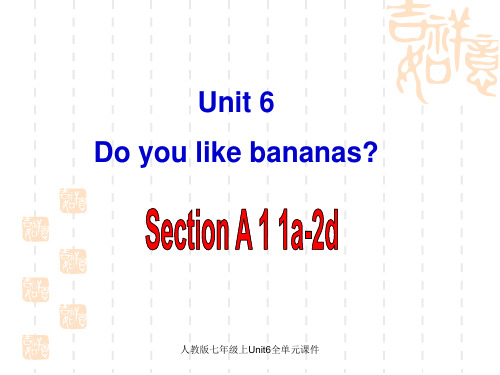
1 B: Yes, I do. A: Do you like oranges?
3 B: Yes, I do.
人教版七年级上Unit6全单元课件
1c Practice the conversations above with your partner. Then make your own conversations.
Bill: Sounds good. John likes hamburgers.
Jack: Oh, I don’t like salad. Bill: But John likes salad,
and it’s his birthday. Jack: Yes, you’re right.
What about the fruit? Tom: I think John likes strawberries and apples. Bill: OK. Let’s have strawberries and apples then.
人教版七年级上Unit6全单元课件
2d Role-play the conversation.
Jack: Hey, John’s birth day dinner is next week. Let’s think about the food.
Tom: Sure. How about burgers, vegetable salad, and some fruit?
strawberry --- strawberries
rice
tomato ---- tomatoes
人教版七年级英语上册第六单元全单元ppt课件

二人称单 复数.第三
like
don't like Do..like...?
Yes,...do./ No,...don't.
人称复数
第三人称 单数
likes doesn't like Does...like...?
Yes,...does./ No,...doesn't.
3a Underline the correct words in the
例词
families dictionaries
boys keys
tomatoes potatoes
photos radios
Plural Forms
Countable nouns可数名词
hamburgers, bananas oranges, pears, tomatoes, strawberries
milk
uncountable nouns不可数名词
tea
water
meat
可数名词和不可数名词
不可数名词 (1)定义:是指不能计数的名词。 (2)不可数名词前不可以用 a , an 限定。 (3)不可数名词前不可以用 one, two , three… 限定。 (4)不可数名词没有复数形式。
Countable and uncountable nouns 既可数也不可数
可数名词复数形式的构成 1
名词特点 词尾加法
单词原形
一般情况下
加-s
desk apple
tree树 orange
以-s, -x, -sh, -ch 结尾的
加-es
以 f 或 fe 改f或fe为v
结尾的
再加-es
box
七上英语Module6-unit2PPT课件
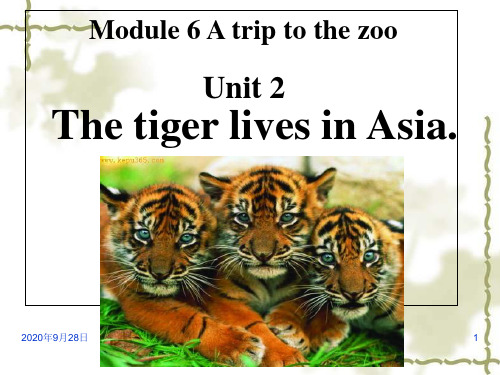
Panda
2020年9月28日
6
The image of Chinese Monkey King
is from it.
Monkey
2020年9月28日
7
Find these places on the map. Africa America Asia Europe
Europe 2
1
Asia
3
Africa
二.用do 、does和doesn't填空.
6.——D__o_e_s this panda come from China? ——Yes,it __d_o_e_s_.
7._D__o__the pandas come from China?
8.—202—0年D_9月_o2_8e日_s_this monkey live in Africa?
2020年9月28日
11
2. It likes water and is good at swimming. 它喜欢水,擅长游泳.
be good at 意为“在……方面 (学得, 做 得) 好、擅长……”, 其后可接名词、代 词或动词的-ing形式, 其近义词组为 do well in.
那些男孩们擅长打篮球.
It’s the king of the forest.
Tiger
2020年9月28日
3
It’s white and black. It doesn’t eat bamboo.
Zebra
2020年9月28日
4
It has a long nose.
ห้องสมุดไป่ตู้
Elephant
2020年9月28日
5
七年级英语上册Unit6课件

Collaboration
To provide opportunities for students to work together in groups, share their ideas, and learn from each other.
通过阅读文章,让学生在实际语境中理解和学习语法的运用。
阅读理解
通过写作练习,让学生运用所学的语法知识,提高语言表达能力。
写作练习
通过角色扮演、情景对话等方式,让学生在口语实践中运用语法知识,提高口语表达能力。
口语练习
BIG DATA EMPOWERS TO CREATE A NEWERA
Text learning
详细描述
选取与七年级学生生活和认知水平相关的文本内容,如故事、科普文章等。
确保文本内容健康、积极,无不良信息。
针对不同学生的兴趣和需求,提供多样化的文本类型和主题。
01
02
03
04
详细描述
教授学生如何理解作者的意图、把握文章的主旨。
引导学生分析文本的结构、语言特点、修辞手法等。
通过文本分析,培养学生的阅读理解能力和批判性思维。
Listening training
选择贴近生活、具有实际交流意义的听力材料,如日常对话、短故事、新闻广播等。
选择真实语境材料
根据学生的听力水平,选择不同难度的听力材料,逐步提高听力难度。
材料难度分级
训练学生通过听力材料的上下文、关键词等预测听力内容的能力。
七年级英语上册第六单元Unit6 ppt课件
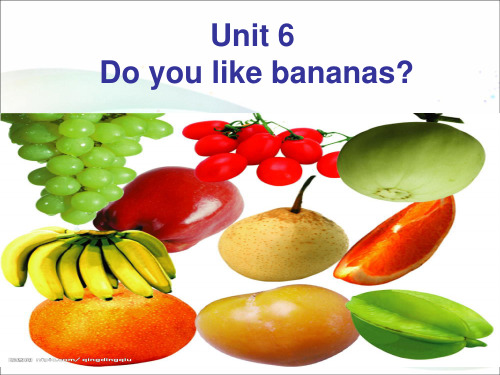
a tomato
five tomatoes
七年级英语上册第六单元Unit6
french fries= potato chips 薯条
七年级英语上册第六单元Unit6
an orange
two oranges
七年级英语上册第六单元Unit6
a strawberry(草莓) many strawberries
Countable and uncountable nouns
chicken
ice cream salad
七年级英语上册第六单元Unit6
可数名词和不可数名词
既可数又不可数名词
定义:在某些情况下能计数,在某些情况下 不能计数的名词。
e.g. (1)a chicken 一只鸡 chicken 鸡肉
vegetables
tomatoes
carrots broccoli七年级英语上册第六单元Unit6
bananas
apples strawberries
fruits
oranges
pears
七年级英语上册第六单元Unit6
Let’s know other(其他的)food(食物)
French fries
第三人称单数
一般疑问句
She has….. She doesn’t have….. Does she have….? Yes, she does./ No, she doesn’t.
七年级英语上册第六单元Unit6
第三人称复数
They have….. 肯定句 They don’t have…..否定句 Do they have….? Yes, they do./ No, they don’t. 一般疑问句
人教版七年级英语上册教学课件:Unit 6 Do you like bananas(共90张PPT)
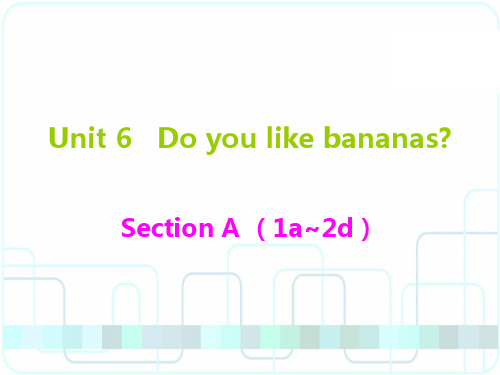
课堂练习
三、根据汉语意思完成句子,每空一词 1. 你喜欢草莓吗? Do you ___li_k_e__ ___s_tr_a_w_b__e_rr_ie_s___? 2. ——你喜欢苹果吗? ——不,我喜欢梨。 —Do you __li_k_e__ __a_p_p_le_s_? —No, I __d_o__n_'t__. I __li_k_e__ __p_e_a_r_s__.
Unit 6 Do you like bananas?
Section A (1a~2d)
课前导学
核心单词 1. ___b_a_n_a_n_a____ n. 香蕉 2. ____h_a_m_b_u_r_g_e_r____ n. 汉堡包 3. ____t_o_m_a_t_o____ n. 西红柿 4. ___i_c_e_-c_r_e_a_m____ n. 冰激凌 5. ____s_a_l_a_d___ n. 沙拉 6. __s_t_r_a_w_b_e_r_ry____ n. 草莓 7. ____p_e_a_r____ n. 梨 8. ____m_i_lk______ n. 牛奶
要点梳理
2. sure的用法 【教材例句】—Let's think about the food. 让我们来 想想(吃什么)食物吧。 —Sure. 当然。 (教材第32页) 【要点思维导图】
要点梳理
【举例】 —Can you help me? 你能帮我吗? —Sure. 当然可以。 I am sure he can come to my birthday party. 我确信 他会来参加我的生日聚会。
要点梳理
2 句型“How about …?”的用法 【教材例句】How about burgers, vegetable salad, and some fruit? 汉堡包、蔬菜沙拉和一些水果怎么样? (教材第32页) 【用法】“How about …?”意为“(提出建议)…… 怎么样?”,用于提出建议或请求,相当于“What about …?”,其中about为介词,后接名词、代词或 动词-ing形式。
人教版七年级英语上册《Unit 6 Section A 2a-2d》课堂教学课件PPT初中公开课

Unit 6Section A 2a-2d人教版 英语 七年级上册ØLanguage Goalsu To learn new words and keysentence patterns.u To talk about the food on John’sbirthday.ØEmotional Goalu To know the food your friends likeand the food they don't like.Do you like …?Yes, I do. /No, I don’t.ØPair workDo you like …?Yes, I do.No, I don’t.A:Do you like hamburger s?B: Yes, I do. / No, I don’t.A: Do you like salad?B: Yes, I do. / No, I don’t.I don’t likeI likehamburgers pears tomatoesstrawberries oranges ice creamsalad bananas Listen and circle the food youhear.2aListen again. Fill in the blanks.tomatoestomatoes ice cream ice cream2bPractice the conversations above. 2cGive answers that sre true for you.I like hamburgers.Yes, I do.Do you like hamburgers?Let’s havetomatoes.Oh, no. I don’tlike tomatoes.What aboutan ice-cream?Sounds good.Talk about your favorite fruit with your partner.Role-play the conversation.Jack: Hey, John’s birthday dinner is next week.Let’s think about the food. Tom: Sure. How about burgers,vegetable salad, and some fruit? Bill: Sounds good. John likeshamburgers.2dJack: Oh, I don’t like salad.Bill: But John likes salad, and it’s his birthday. Jack: Yes, you’re right. What about the fruit? Tom: I think John likes strawberries andapples.Bill: OK. Let’s have strawberries and apples then.Complete the conversation.I like __________. Do you like _____?Yes, I ____. _____ Sally _________?No, she doesn't.Let's ________________.That _______ good.ice-cream sounds have an ice-creamdo it Doeslike it1. John’s birthday dinner is next week.“next week” 译为“下周”,英语中的“next”, “last” 后跟表示时间的词语构成时间状语,如: next day第二天last month上个月next month下个月last week上周next year明年last year去年2. Let’s think about the food.让我们来想想(吃什么)食物吧。
外研版英语七年级上册Unit 2 (6)课件

We start lessons in the afternoon at half past one.
Post-reading:
Find out these sentences from the passage.
1. I get up at half past seven in the morning, and then have breakfast.
上课 吃饭 休息 玩的愉快
看一看
Write a passage about Chinese school days, write sentences like: I/We get up at … I/We go home at … I/We homework at …
go home是一个固定搭配,意为“回家”。 因为home在这里作副词, 故home的前面不能 加介词to。 关于 go的短语:
go to school “去上学” go to work “去上班” go to bed表示“去睡觉”
3. We start lessons in the afternoon at half past one. start, 意为"开始;着手",
F
• 3、We have a break at eleven o’clock.( )
nine o'clock F
T
•Read paragraph 4-6 and answer the questions. •1、Where do we have lunch?
•2、WWheehnadvoe
lunch in the dining hall. we start lessons in the afternoon?
Unit6+Reading2+课件2023-2024学年牛津译林版七年级英语上册
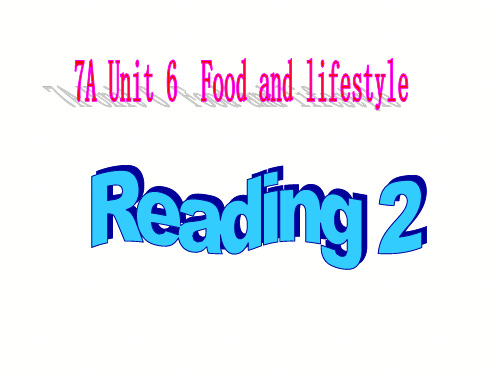
3. be important for sb. 对某人重要
It’s important for sb. to do sth. 对某人来说做某事是重要的
2) 对在句中作状语用的 always, usually, often,
sometimes, every …., once a month, three times an
hour 等表示频度的副词或短语提问时, 要用how often。
e.g. He goes swimming once a week.
II. 用括号内所给单词的正确形式填空。
1.It’s important for me to read (read) English. 2. There is (be) too much sugar in sweet snacks. 3. Taking a walk after meals is good for ourh_e__a_l_th___
3)exercise运动,锻炼,不可数名词 do exercise/ take exercise Miss Wang __d_o_e_s_/_ta_k_e_s__e_x_er_c_i_s_e__every morning.
王老师每天早上锻炼。
4) exercise运动,锻炼,动词
Miss Wang ___e_x_e_r_c_is_e_s__every morning.
9. too much +不可数n. 太多 too many +可数n. 太多 much too + adj. 简直太
